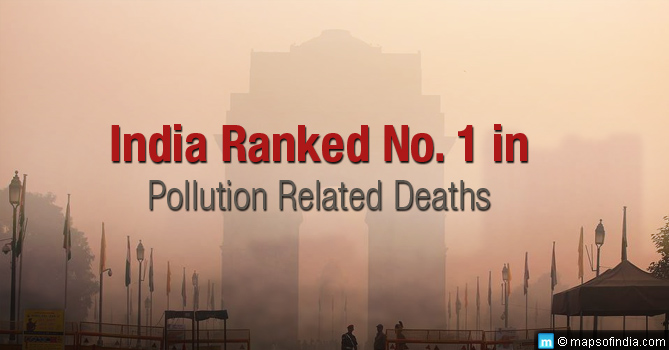Each year Diwali brings with it much happiness and warmth. It also brings with it damaging pollution and thick, choking fumes. In 2016, the schools in the national capital had to stay shut for a few days and many factories and construction sites remained closed due to the smog that had made breathing difficult. This year the Supreme Court banned the sale of crackers in Delhi. Despite a steady stream of such news reports making it to the headlines, the seriousness of the situation, the alarming effects of pollution do not seem to have sunk in yet.
The Lancet Commission Report
Sounding the alarm bells is the latest report by The Lancet Commission on pollution and health. The report was released about a week ago and states that India now holds the top slot among all the countries going by pollution-related deaths. In the year 2015 alone some 2.51 million deaths in the country have been attributed to pollution and its fallout. Our country, thus, seems to have upstaged China which had previously held the top slot for number of pollution related deaths in the world. In 2015, China recorded 1.8 million deaths due to pollutants. Pakistan, Bangladesh, and Russia are other Asian countries which record exceptionally high numbers of death due to pollution.
The Lancet Commission report is one of a kind – it is the first ever worldwide analysis of pollution and its cost to human lives and national economies.
Unraveling Pollution-Related Deaths In India
India is the worst affected country in the world in terms of pollution-related mortality. The Lancet Commission report claims that a staggering 0.97 million people died in the country (in 2015) due to air pollution within the households caused by burning solid fuels. Another 1.09 million people died that year due to the ambient air pollution in the country.
Air pollution, though the deadliest among environmental pollution, is not the only threat India is facing. Consumption of unsafe drinking water has caused about 0.5 million deaths in India (2015). Unsafe sanitation caused another 0.32 million deaths. Lack of access to public or private toilets and poor sanitation is a major concern particularly in the rural parts of the country.
About 70 percent of the deaths due to pollution occurred manifested as non-communicable diseases. Lung cancer, high blood pressure, chronic obstructive pulmonary diseases, and renal failure are the commonest diseases caused by pollution.
The cost of pollution to the economy is also quite high. The country loses about 0.32 to 0.40 of its GDP due to air pollution-related productivity loss.
Worldwide Statistics
Worldwide, about 9 million premature deaths have been attributed to pollution and toxic emissions related diseases. This adds up to almost 16 percent of all the deaths occurring across the world. Air pollution, in particular, seems to have been the leading cause among these deaths.
Death due to pollution related diseases accounts for three times more deaths than malaria, AIDS, and tuberculosis put together. It also causes about 15 times as many deaths as caused by violence and war in the world. Pollution is a bigger threat than all natural disasters. Smoking too is a lesser evil than pollution, the report claims. About 92 percent of all pollution-related deaths occur in countries falling in the middle and low income categories.
In middle income countries, pollution and related diseases alone account for about 7 percent of the healthcare spends each year. This cost will increase dramatically if the worst affected countries do not quickly come up with an action plan.
Time For Action
“Pollution, which is at the root of many diseases and disorders that plague humankind, is entirely preventable”, says the author of the Lancet Commission report Bruce Lanphear. This is particularly true of India where the crisis is imminent.
What comes as a bigger worry that the report’s revelations, is the fact that the government of India does not seem to place much trust on its findings. The Ministry of Environment, Forest and Climate Change (MoEFCC) told the Supreme Court that such global studies do not have any conclusive proof linking the deaths to (air) pollution and are very misleading. It is high time the government seriously considers the threat posed by environmental pollution and craft legislations to counter it. Awareness and action are the two tools that Indians must adopt to combat pollution and prevent disease caused by air, water, and soil pollution.





